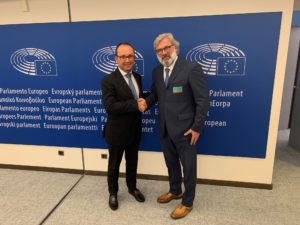
The Green Deal as a lever for the competitiveness of our industrial system
In my view, I see the European Green Deal as the starting process of modernizing the European Industrial Sector by addressing a double challenge simultaneously: the green conversion and the digital transformation. The Green Deal will shape substantially EU’s new model of economic growth for the next decades, aiming to increase European industry’s competitiveness in an increasingly resource constrained world that almost collectively tries to overcome climate change. Industrial leadership will be a key factor in the geopolitical context, as those who set the production standards today are those who control the international markets tomorrow. It is estimated to take up to 25 years to transform European industry according to the Green Deal’s fundamentals, therefore, EU’s institutional’ decisions in current mandate are crucial to achieve a digital, circular and climate neutral industrial sector by 2050.
It will be of utmost importance to succeed in designing a new industrial strategy that will enable European industry to manage the great challenges of the transformation required to make Green Deal a successful story. During the transition process, it will be critical to ensure our industry’s ability to withstand its global competitors and continue to export on global markets, while our main competitors are not facing financial burdens of similar transformation processes. I consider that EU’s new industrial policy should be funded on a strong competition policy and significant transition funding for the industrial regions most impacted by the green transition through a Just Transition Mechanism opened to further financial consolidation. As the ENVI responsible of Horizon Europe Programme 2021-2027, I would stress first that the success of the Green Deal will be directly linked to the robustness and capacity to deliver of EU’s research program. Proper investment will be instrumental for boosting global competitiveness of Europe’s industries in areas such as robotics, artificial intelligence, supercomputing, 5G, cloud, batteries and clean hydrogen. In this context, I would like to highlight the important mission of the European Innovation Council to succeed in bridging European Union’s long-existing gap from excellent research results to market deployment and ensure that breakthrough industrial innovation reaches our production processes.
A key element of the digital transformation of EU’s industry will be represented by our ability to collect, storage and process industrial data by artificial intelligence’s algorithms, which will increase dramatically industrial efficiency and productivity and strengthen overall competitiveness of European industry. Europe can maximize industrial performance by combining EU’s technological and industrial capabilities in a coordinated manner and further develop and update the digital infrastructure across Member States by adequately funding indispensable EU instruments such as Connecting Europe Facility and Digital Europe. High volumes of data will require inevitable measures to ensure data-sovereignty and will enable European Union to become a major global hub for data, opening up important opportunities for Europe’s digitalized industry.
EU’s energy-intensive industries such as steel, chemicals and cement remain indispensable to Europe’s economy. Modernization and decarbonization of these industries will be crucial to achieve 2050’s climate-neutrality objectives and increase competitiveness. Feasible solutions have been already foreseen under the Green Deal planning and I highlight the necessity to broaden and revise the EU Emissions Trading System and particularly to strengthen the Innovation and Modernization Funds and further develop innovative low-carbon technologies and processes, such as Carbon capture and utilization (CCU), Construction and operation of carbon capture and storage (CCS) and energy storage.
A clean industrial sector will require adequate market access. I consider of outmost importance to address in due time market barriers to the deployment of clean products and ensure a level playing field for our industry, which often faces unfair competition from third countries-based industries.
I remind you, while European industry will be required to mobilise considerable investments in technological development and deployment of the new technologies, other parts of the world will not face such financial constraints. In this regard, I recall the concerns and the necessity of establishing in a timely manner Green Deal’s carbon border mechanism, in order to reduce the risk of carbon leakage, ensure that price of imports reflect their carbon footprint and avoid jeopardizing the global competitiveness of EU’s industries during the transition process.
The Green Deal also aims to deepen the switch of focus from extracted materials to waste and recycled materials, which currently represent just 12% of total material used. This strategy can generate a notable international advantage, reduce production costs, decrease Europe’s industry import dependence and cut green gas emissions. But the process will require strengthening our efforts in developing a homogenous market for climate-neutral and circular products. A comprehensive circular economy action plan with clear principles could become, as other EU policies, a worldwide model of developing sustainable products, where European Union will benefit from the first to act. Finally, a successful industrial transition towards climate-neutral will require a massive both public and private investment. In this regard, I firstly highlight the decisive role of the European Investment Bank in the years ahead and secondly, I underline that industrial competitiveness represents a major factor in determining private investment attractiveness.
European Union will face the unprecedented mission to increase in a balanced manner both private investment and sustainable and climate neutral productivity.
To conclude, I personally see the Green Deal as a new opportunity for our industrial sector. An accelerated process of an inevitable industrial evolution, where the European Union takes the leading role.

















